A skull fracture negligence claim is when you seek compensation for medical negligence when you have suffered a fracture of the skull. A paramedic may miss the skull fracture, or the hospital doctor may misread the X-ray, but you could have a skull fracture negligence claim.
A medical professional owes you a duty of care. If you suffer when they breach that duty of care, you may have a medical negligence compensation claim. Medical negligence is care by a medical professional below that any other medical professional acting in similar circumstances would provide.
When the GP sends you home instead of sending you for an X-ray, the paramedic fails to inform the A&E team that you hit your head, or the hospital consultant fails to refer you for an MRI, you could have a skull fracture negligence claim.
The Medical Negligence Team can examine your case and see if you have a valid skull fracture negligence compensation claim.
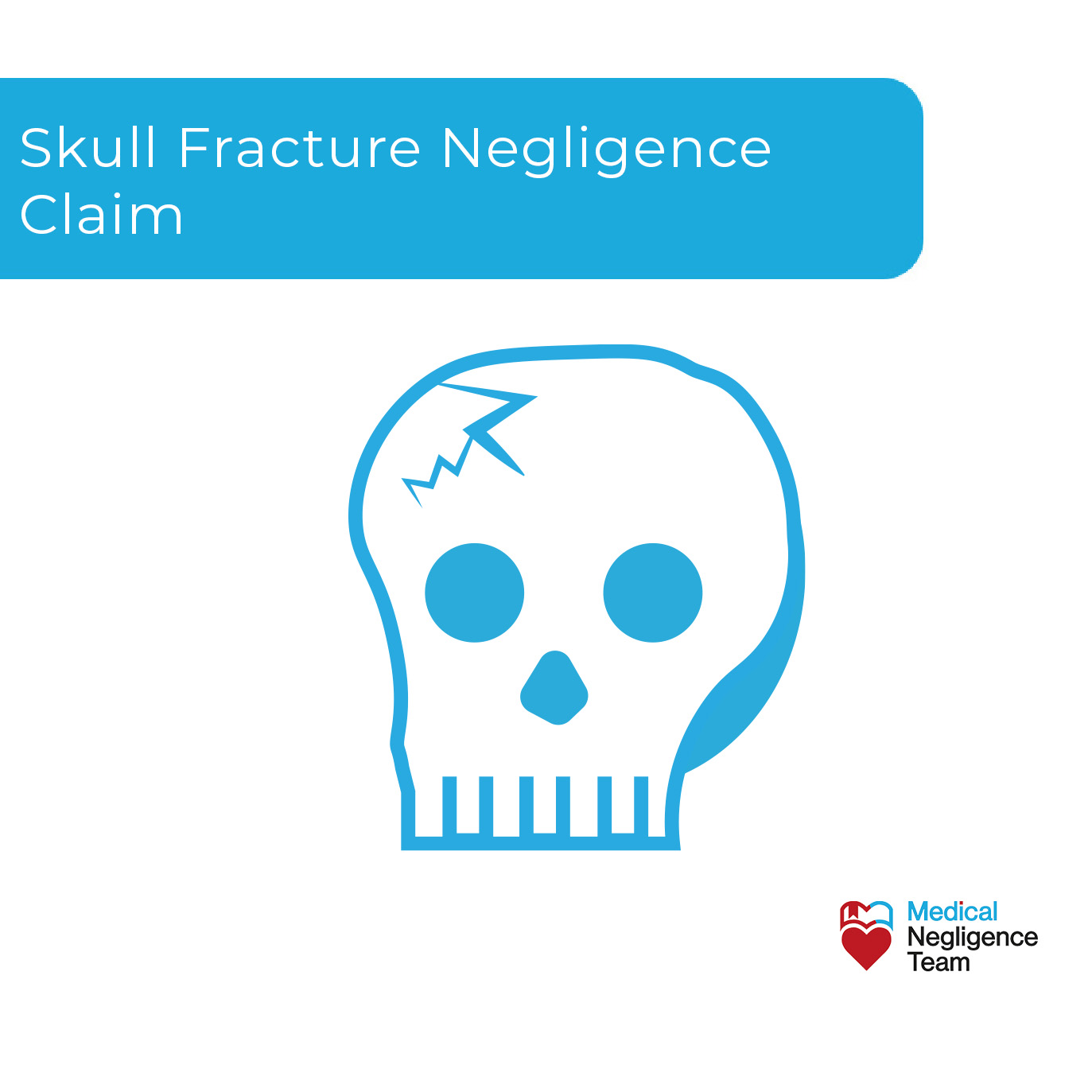
Table of Content
What is skull fracture negligence?
Skull fracture negligence is when the medical professional treating you does not diagnose or send you for further tests when you may have a skull fracture. The medical professional owes you a duty of care, and to breach that duty of care could be skull fracture negligence.
If you or a loved one suffers a head injury, the doctor or paramedic treating you should look for signs of a skull fracture. You could need emergency medical treatment such as surgery, and to miss one or more symptoms of a skull fracture may be medical negligence.
Common symptoms of a skull fracture are:
When you or a loved one suffers a head injury or possible head injury, the examining medical professional should look for the symptoms of a skull fracture. To not look for a skull fracture or to miss signs of one could be skull fracture negligence.
If you or a loved one suffers medical negligence when you are being treated for a head injury, you could have a skull fracture negligence compensation claim.
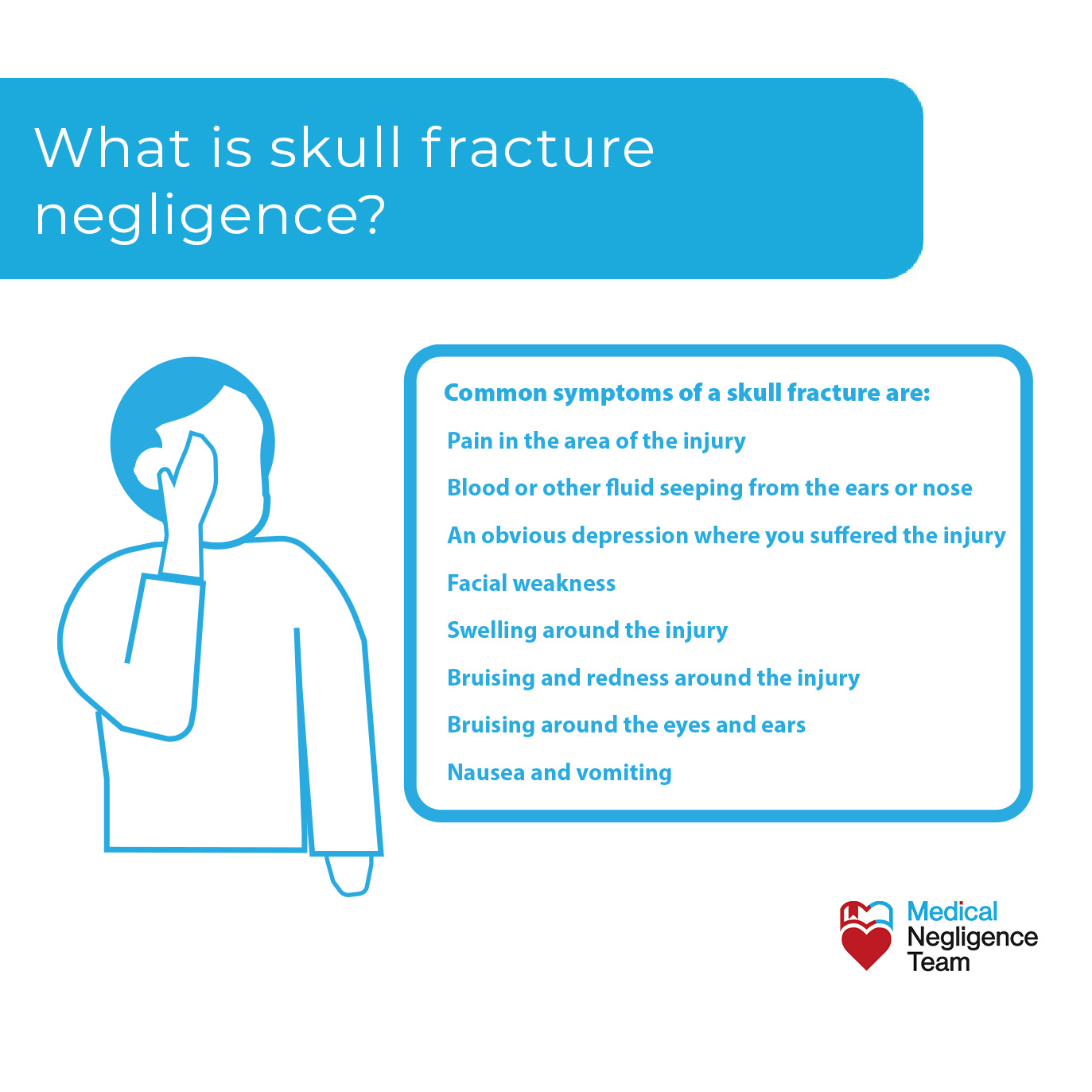
Common claims for skull fracture negligence
Common claims for skull fracture negligence range from a missed diagnosis of a skull fracture by the hospital consultant to errors when reading an X-ray to medical negligence by the paramedic.
The patient may suffer unnecessary pain, trauma, and mental anguish if there is skull fracture negligence and may be able to claim compensation for the effects of the injury on their lives today and in the future.
Common claims for skull fracture negligence:
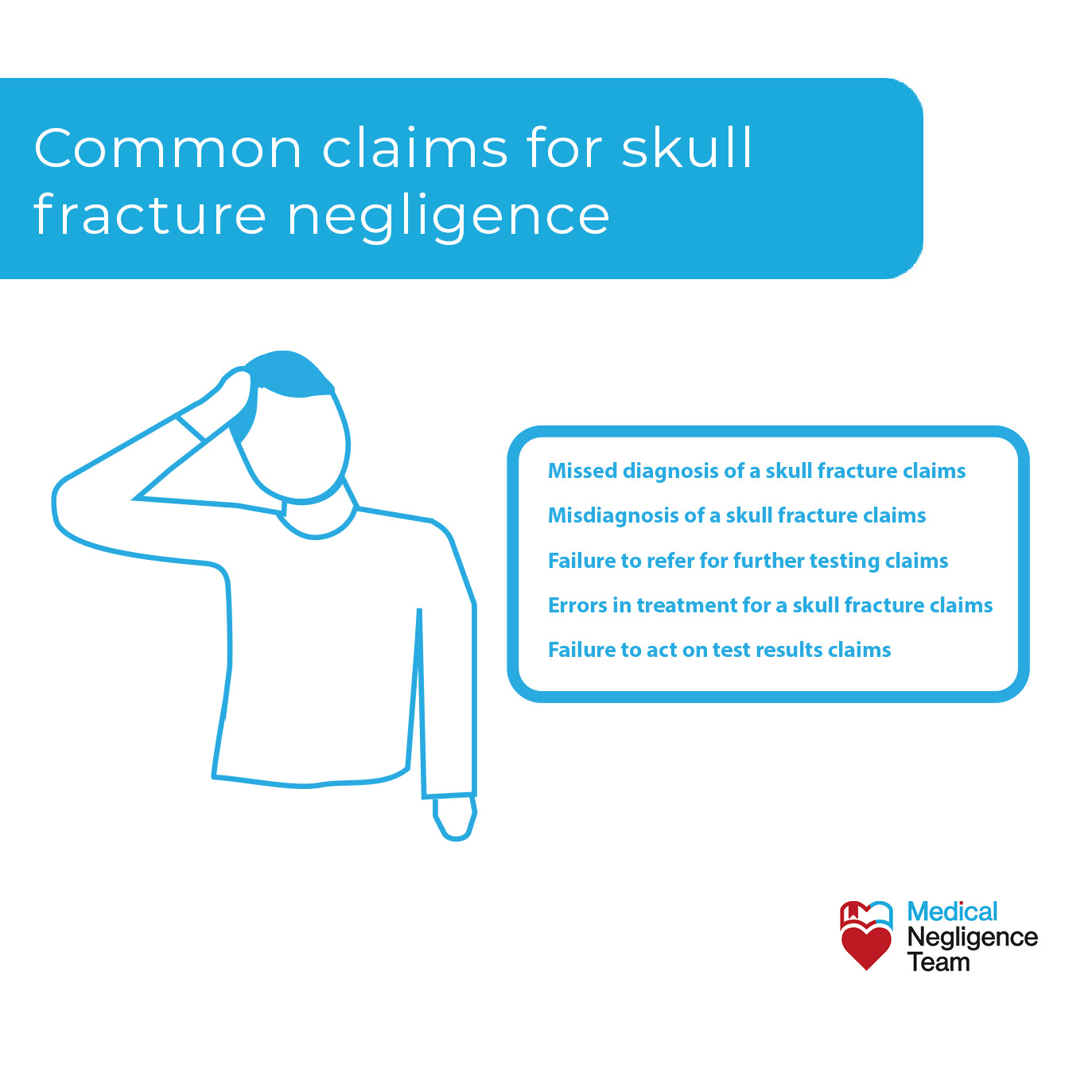
Missed diagnosis of a skull fracture claims
Missed diagnosis of a skull fracture claims are for medical negligence when you are being treated for a possible head injury. The medical professional should look at your accident notes to accurately diagnose your possible injuries.
The medical professional should look for a skull fracture after:
If the patient is showing any of the symptoms of a skull fracture after being injured in an accident, the medical professional should diagnose a possible skull fracture and send the patient for further tests.
Misdiagnosis of a skull fracture claims
The misdiagnosis of a skull fracture claims are for when the paramedic, A&E doctor or even the GP diagnoses a skull fracture as another injury. You could lose valuable treatment time and risk the skull fracture developing into a worse injury if there is a misdiagnosis of a skull fracture.
A misdiagnosis of a skull fracture can be:
If you suffer a misdiagnosis of a skull fracture, you may have a medical negligence claim for compensation due to the effects of the injury on your life.
Failure to refer for further testing claims
Failure to refer for further testing is a common claim for skull fracture negligence compensation. Further testing is an excellent diagnostic tool and should always be used when a patient has suffered a head injury.
A failure to refer for further testing claims are when:
The examining GP, paramedic or hospital doctor should consider the circumstances of your injury and refer you for further tests if you have any symptoms of a skull fracture.
Errors in treatment for a skull fracture claim
Errors in treatment for a skull fracture can make the injury worse or worsen the effects of the skull fracture on your life or that of a loved one. Prompt and accurate treatment is vital for treating a skull fracture and improving the patient’s chances of a full recovery.
Errors in the treatment of a skull fracture are:
Any errors in the treatment of a skull fracture could cause brain injury and possibly the death of the patient.
You or your loved ones may have a skull fracture negligence claim for compensation if you suffer such medical negligence.
Failure to act on test results claims
Failure to act on test results claims happen when the treating doctor or hospital consultant does not order the correct course of action when your test results show a skull fracture.
Failure to act on test results can be:
Any failure to act on test results risks a skull fracture pressing on the brain, increases the chances of infection and causes the patient unnecessary pain and trauma.
When you suffer medical negligence with a possible skull fracture, you may have a compensation claim.
Compensation for a skull fracture negligence claim
You can seek compensation for skull fracture negligence in amounts from the low £10,000s to over £10 million in some cases. Medical negligence by a paramedic or hospital consultant, when you have a suspected skull fracture may be due to the pressure of their work or by not giving you the care needed, but the error can have many effects on you, and you can claim for those effects today and in the future.
The compensation awarded when you suffer skull fracture negligence is for the failure to refer you for further tests, to diagnose a skull fracture or in the treatment of the head injury. You can claim for the effects of the missed skull fracture, and the amount of compensation depends on several factors, such as how much discomfort and disruption you experience in your life today and in the future.
Claims sometimes see high awards, such as when the patient suffers brain damage due to the skull fracture negligence, or they contract an infection during treatment or lack of treatment for the skull fracture.
Compensation for skull fracture negligence can see awards of:
All amounts are approximate and are only a guide to what is possible in a skull fracture negligence claim. Figures can be high in some claims as you or a loved one could need long-term care, and you may face medical bills for life due to any errors in the diagnosis and treatment of a skull fracture.
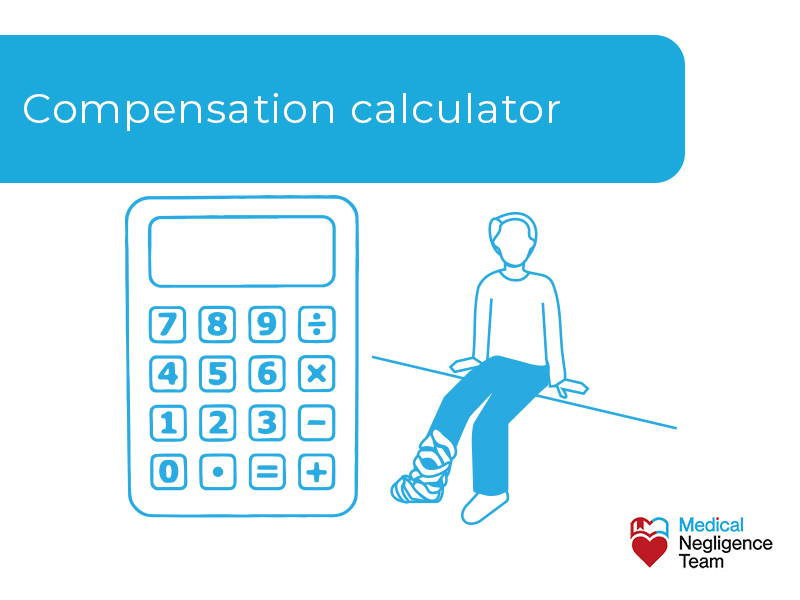
You may be able to claim for these care expenses and the medical costs in the future with a skull fracture negligence compensation case.
As in all medical negligence claims, each case is dealt with on merit and how much the patient suffers due to the skull fracture negligence by the A&E doctor, paramedic, or orthopaedic consultant.
A No Win No Fee medical negligence solicitor will be the one to advise you on a skull fracture negligence claim. They will know from experience what your case may be worth and how to make a successful compensation claim.
Our Process
Our team members have a higher career win rate with a 75% success rate on NHS letters of claim, compared to an industry average of 54.5%.
Enquiry
The first step is to get in touch and tell us what went wrong. It’s free and easy. Call our 24-hour helpline: 0800 246 1122 or request a callback here.
Medical Evaluation
Once you have spoken with our team we’ll let you know how we can help. Typically the next step is to obtain your medical records for us to review.
Legal Letter
Once all your medical records have been received they will be reviewed by a medically & legally qualified member of our team. If there is evidence of negligence we will send a letter of claim to the negligent party outlining your compensation claim.
Who is eligible for compensation in a skull fracture negligence claim?
The patient who suffers pain, disability, or anxiety and sees their condition getting worse due to skull fracture negligence may be eligible to claim compensation. A misdiagnosis of a skull fracture can cause brain damage or increase the effects of brain damage or infection, and you may face avoidable medical treatment, for which you could claim compensation.
The medical negligence has made you ill, and the poor medical treatment may also affect your recovery and your time in recovery. A patient can claim compensation for the effects of the medical negligence on their life today and in the future.
The patient is the one to suffer due to the brain damage, constant headaches, and treatment for an infection. Errors in diagnosing and treating a skull fracture may cause the condition to get a lot worse or even put the patient’s life in danger.
Medical negligence may lead to psychological trauma, unnecessary pain, and disability. The patient, though, may be unable to claim due to the effects of the medical negligence, and their dependants may be able to make the compensation claim.
The loved ones in a skull fracture negligence case are known as ‘dependents’ and can be:
When you have a skull fracture negligence claim, your No Win No Fee medical negligence solicitor can help make the case for compensation.
What can you claim for in skull fracture negligence compensation?
You can claim compensation for any damages that occurred when you sue in a skull fracture negligence case.
There are two types of compensation damages due when suing for any type of medical negligence, such as skull fracture negligence:
You deserve compensation to cover all losses, including loss of life for dependents, medical costs, and long-term care needs.
When you or a loved one experiences unnecessary suffering due to negligence by a medical professional, such as that caused by a missed diagnosis or misdiagnosis of a skull fracture, you can claim medical negligence compensation.
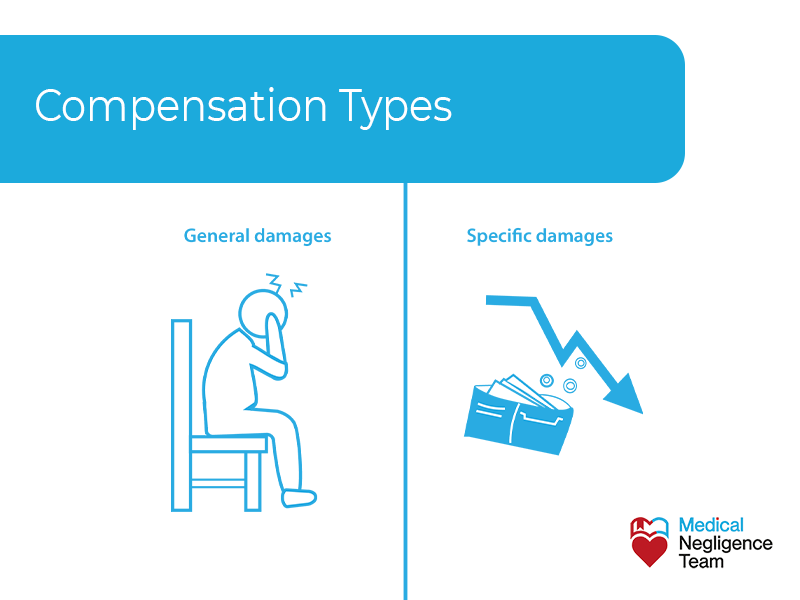
Who is responsible for skull fracture negligence?
A medical professional can be responsible for your skull fracture negligence. They are the ones who owe you a duty of care, and when they breach that duty of care by making a misdiagnosis of a skull fracture or causing further injury during treatment, then you are the one to suffer.
The NHS is a hard-working and excellent health service for the people of the UK. Administrators and medical professionals working within the NHS can make errors, which may lead to medical, like a missed diagnosis of a skull fracture or the failure to refer for further scanning.
Those responsible for your skull fracture negligence can be:
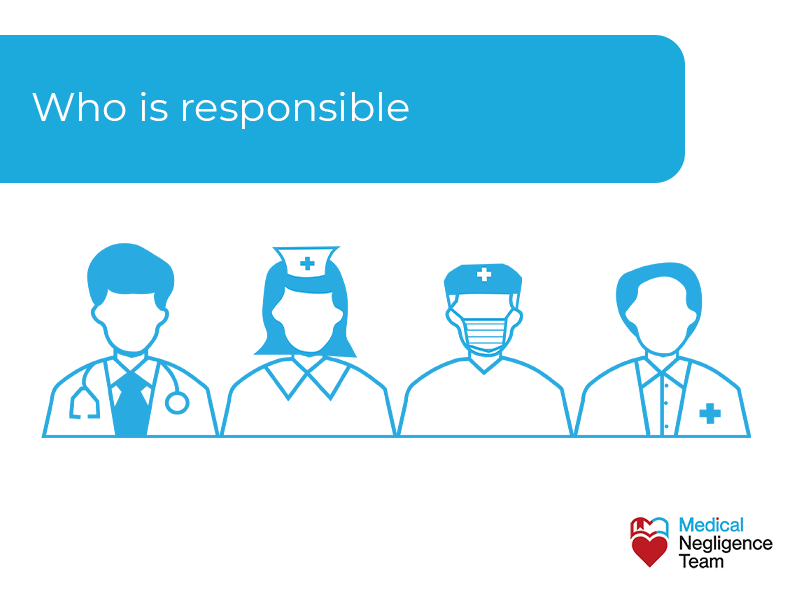
Skull fracture negligence, such as surgery errors, paramedic errors and treatment errors, can have severe, long-term effects on your life and that of your family and loved ones.
When you experience skull fracture negligence in the hospital, GP clinic or from a paramedic, you or your loved ones may have a claim for medical negligence.
How to make a claim for skull fracture negligence
The steps involved in making a claim for skull fracture negligence go from seeking medical advice to issuing court proceedings when you suffer negligence in your diagnosis or treatment after an injury involving the head area.
The steps are a part of any successful compensation case, and settlement can happen at any stage in the process.
Your medical negligence solicitor will do the rest when you follow the steps correctly and gather all the facts and figures.
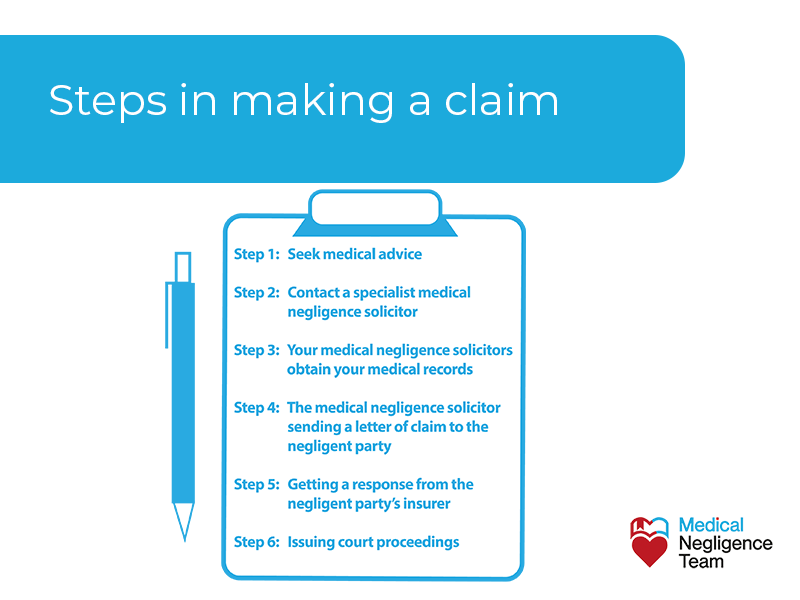
Our Process
Our team members have a higher career win rate with a 75% success rate on NHS letters of claim, compared to an industry average of 54.5%.
Enquiry
The first step is to get in touch and tell us what went wrong. It’s free and easy. Call our 24-hour helpline: 0800 246 1122 or request a callback here.
Medical Evaluation
Once you have spoken with our team we’ll let you know how we can help. Typically the next step is to obtain your medical records for us to review.
Legal Letter
Once all your medical records have been received they will be reviewed by a medically & legally qualified member of our team. If there is evidence of negligence we will send a letter of claim to the negligent party outlining your compensation claim.
How long do I have to make a claim for medical negligence?
You have three years to make a claim for medical negligence. All medical negligence claims are subject to limitation periods.
For example, in England and Wales, medical negligence cases for skull fracture negligence must generally be brought and court proceedings issued within three years of the injury or three years of knowledge of the facts giving rise to the claim.
If someone has passed away due to a breach of duty of care by a medical professional, it is the date of death if the limitation period has not expired by that time.
Children not under a disability typically have until they reach 21 to start a medical negligence claim or court proceedings.
Persons with a disability, who lack capacity, are not subject to any limitation period.
Will I have to go to court with a medical negligence claim?
No, you are very unlikely to have to go to court with a medical negligence claim.
The majority of cases are settled well before there is a need for court action, and NHS Resolution will see most cases are dealt with, in conjunction with your solicitor, before a referral to court by either side.
Medical negligence in the diagnosis of a skull fracture by a paramedic, errors in the treatment by an orthopaedic surgeon and mistakes with reading an X-ray or MRI scan can cause you and your family a lot of distress. If you discover the errors could be due to medical negligence, you will want answers and compensation for the effects of the skull fracture negligence.
Your solicitor will want to keep the medical negligence claim out of court and get it settled in your favour as quickly as possible.
If your claim is one of the very few cases that do go to court, it will be handled by your No Win No Fee medical negligence solicitor.
Using a No Win No Fee medical negligence solicitor
Using a No Win No Fee medical negligence solicitor is the only way to a successful compensation claim for medical negligence. Your No Win No Fee medical negligence solicitor will not charge you for a claim you do not win.
The medical negligence solicitor will have experience dealing with the NHS and insurance companies when handling any skull fracture negligence claim. They will know the causes of the skull fracture negligence, who caused the medical negligence, and the possible effects of negligence by a medical professional.
Your No Win No Fee solicitor will handle your compensation claim when you suffer skull fracture negligence and know how to make it a successful compensation claim.
Always have a fee agreement in place before engaging a medical negligence solicitor. If they start talking of a ‘win fee’ or a ‘success fee,’ you should walk away. The negligent party insurers should pay all fees.
The medical negligence solicitor should also operate a 100% Compensation Guarantee scheme. When you win the case, all the money awarded should go to you, not the solicitor.
You are the one who experienced the medical negligence, and you deserve the compensation to get your life back to normal.
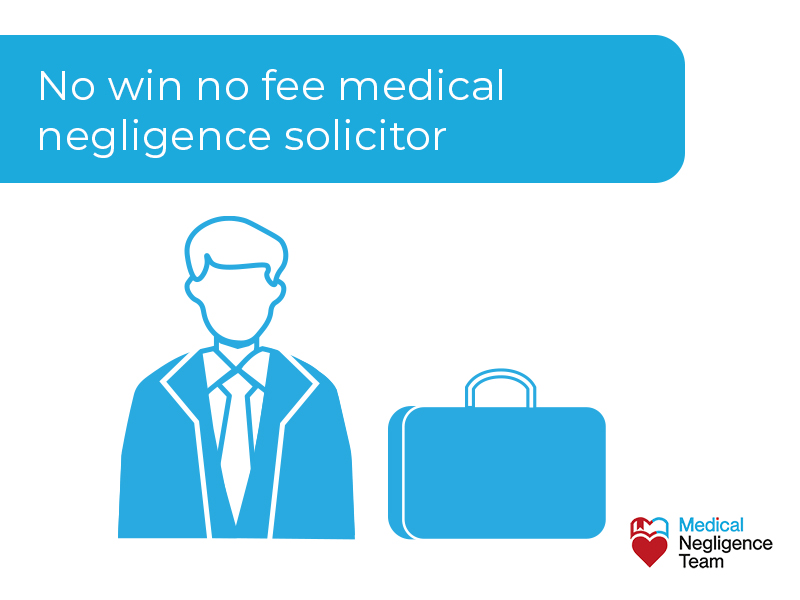
Contact The Medical Negligence Team
Contact the Medical Negligence Team today to discuss your claim for skull fracture negligence today. You suffered from the effects of the medical negligence, like an infection after skull fracture surgery, and you may be able to claim compensation for the skull fracture negligence.
At the Medical Negligence Team, we fight every compensation claim on a No Win No Fee basis, and you will not be out of pocket for an unsuccessful claim. We have both the legal and medical experts to guide you along the steps to a successful claim for compensation.
We have a very high success rate and a reputation for a speedy and successful resolution to medical negligence claims for skull fracture negligence.
Our 100% Compensation Guarantee puts all the money you win into your pocket. You may have a compensation claim if you experience negligence in your diagnosis of a skull fracture or errors during surgery or get an infection due to the care after the skull fracture surgery.
Contact us at the Medical Negligence Team, and let us handle your claim for skull fracture negligence compensation.

